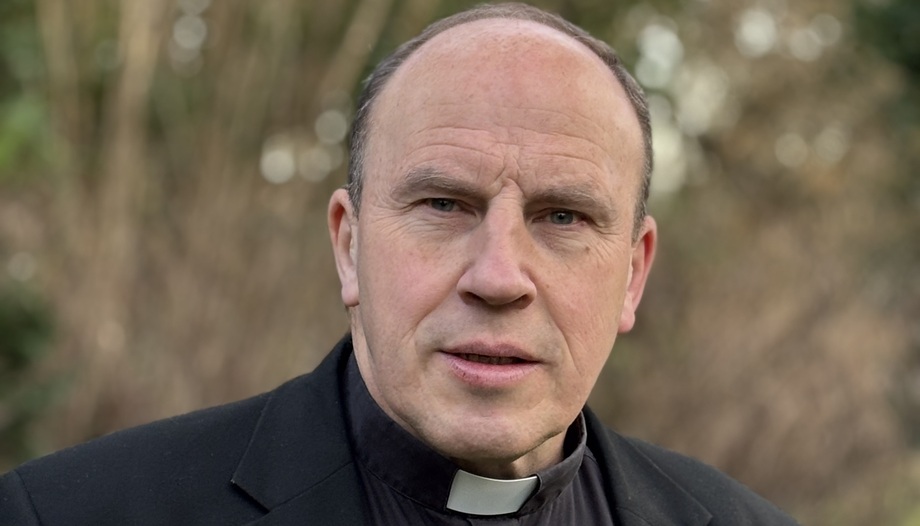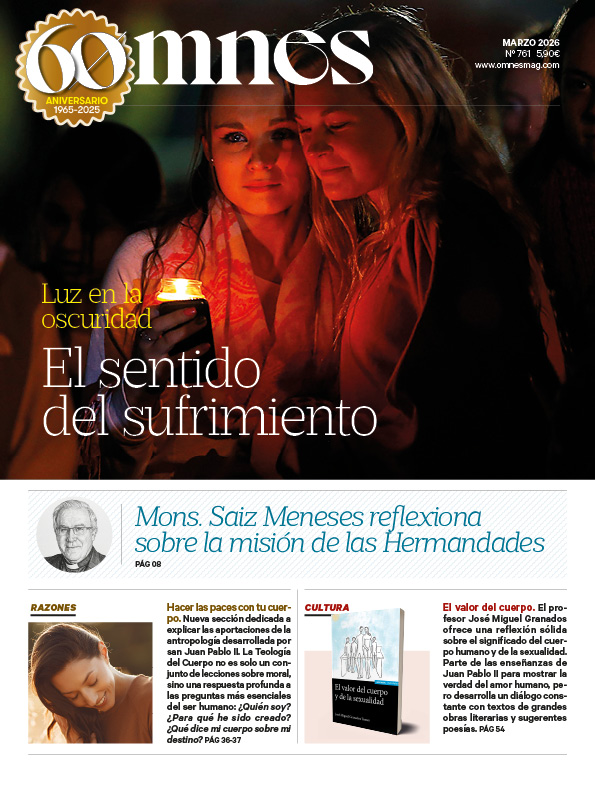Father Joseph Evans is a chaplain in Oxford. He has been ministering to a multitude of people, especially university students, for years. Now, however, he wants to reach even more people by publishing his first collection of poems, "When God Hides" (When God hides), published by SLG Press.
In this interview with Omnes, he not only explains some fragments of his work, but also talks about the importance of the poetic sense and the relationship between poetry and spirituality.
What inspired your poem "Verbum"?
- "Verbum" is the final section of a four-part poem entitled "Rome," written while I was studying in that city, though much revised later. Living in Rome was difficult for me, so it all fits into that context. On the other hand, the stay in Rome did me a lot of good.
First of all, the poem tries to express the experience of walking those streets and thinking that the first Christians would have walked them too, perhaps St. Peter, for example. But, as a Catholic, I was very impressed by how Italians manage to ignore the Church, God and faith. So we have a very Catholic city that, in many ways, is indifferent to God, and I reflect on that in parts one through three of the poem. Which brings us to the fourth part. And as a poet I'm very conscious of words, words mean a lot to me. But there is only one word that says it all, which is The Word, Christ. I was aware of the power of that Word, which knocked St. Paul to the ground, conquered the hearts of the saints, led them to martyrdom and much more.
In the poem there are numerous biblical references and through them I tried to talk about how God wins us over.
And I was also thinking about the state of the Church, which in many respects is not so healthy, but the power of the Word continues like the "wind" in its "cancerous lungs,
its sails in tatters," as I write. In Rome one feels both the strength and the weakness of the Church. There is a tinge of sadness in the poem, but above all of optimism. And that same spirit is also found throughout the collection.
Are there any psalms, biblical passages or poets that have particularly influenced your poetry?
- I was certainly inspired by the Psalms, but they were not my main source of inspiration. And the Old Testament contains a lot of beautiful poetry, especially the Song of Songs. I especially like the part of the book of Sirach where it describes a frozen lake that is "clothed as with a breastplate" (Sir 43:20). What an amazing image!
I am glad that poetry occupies such an important place in the Bible, and one of the best ways to describe the relationship between God and the soul is through poetry.
There are several poets who inspire me. The 19th century English Jesuit Gerard Manley Hopkins is one of them. In my opinion, he is one of the greatest poets in English literature.
He is full of faith and some of his poems are extraordinary expressions of his relationship with God, but he is also technically brilliant and even revolutionary.
I really like TS Elliot and the Portuguese poet Fernando Pessoa.
What role does poetry play in your ministry as a priest?
- In one sense not much, and in another a lot. As a Christian, poetry affects my life a lot. For me, everything is part of the poetry of life. As a Christian and as a priest, it inspires me a lot. I go through life being very sensitive to the things I see and hear: images, city scenes, nature, all of which awaken poetry in me.
However, in another sense, not very much, because I have to be very careful, as I think people have lost that sense of poetry, so I rarely quote poetry in a meditation or while preaching, and if I do, I do it very carefully!
Speaking of being sensitive to the things you see, what does your poem "Dung" really mean? It's a striking subject for a poem, what was your inspiration?
- That poem comes from my time in Manchester. I have a great love for that city, which is reflected in several of the poems in the collection. I was inspired by a pond I used to walk or run by and, in doing so, I often had to be very careful to avoid the dung from the geese on the pond.
Most of all, I have fun with the poem. But thinking deeper, God is also there and I saw his loving presence even in that dung, like an icon. Everything can speak to us of God's love, and a very important theme of the collection is me trying to learn to be a child again before God, in every possible way, even in the way He seems to play hide-and-seek with me, like a father with his child.
The title of the collection is "When God hides", but you seem to see God everywhere, in everything and everyone. Why did you choose that title?
- As the prophet Hosea explains, God led Israel into the desert, but only to bring them closer to him, to "woo" them, God says, as a man wooed his wife (Hos 2:14). In recent years, my spiritual life has felt a bit dry, but with great joy and hope, because I see that this is God's game. It has taken away some consolations and made prayer a bit dry, but that same dryness is bringing me closer to Him.
He hides only for me to seek Him, He encourages me to seek Him. And He still finds ways to reveal Himself.
What was the biggest challenge in combining spirituality with poetic language?
- Here Gerard Manley Hopkins can be useful to us. He often used the sonnet form, and he saw in that discipline, in that strict poetic form, in that tightly crafted language, that we can find God in the limitations imposed on us by our existence. The very search for God is poetic, in the sense that it recognizes a deeper level of reality, and poetry also recognizes that deeper level. Even non-religious poetry intuits that there is something more, a deeper reality to draw from, whether it is a feeling, a vision of life, or whatever.
And, besides, poetry is about rhyme and rhythm, and ultimate rhyme and rhythm are the life of the Trinity. Even a simple rhyme is a form of communion, one line captures the sound of another, and when there is good rhythm in a poem everything works together. To me, these are expressions of Trinitarian communion.
Somehow, through poetry, one tries to enter a little more into that communion.
How do you expect this book to influence those who read it, believers and non-believers?
- I only write this book because I think it can help other people. What I hope is that the more religious poems will help those who have a relationship with God, and that some of the things I say will have an impact, that they will mean something to them and help them pray.
But I also hope that some of the less religious poems will lead people to the religious. I hope my poems will help people appreciate that faith doesn't have to be serious, solemn and boring.
How did the idea for this book come about?
- I have been writing poetry since I was very young. When I was 17 or 18 years old I was given a notebook for Christmas with the intention of writing my poems. It was the first time someone took me seriously as a poet, and that encouraged me a lot.
Since that time I have written a lot, but somehow never got it published. This collection came about in many ways by chance here in Oxford, I was filling in to say Mass somewhere, because the priest was away. I joined the cafe after Mass to talk to the parishioners and met someone who told me he was a poet, Edward Clarke, himself an excellent poet as I was to discover. I told him that I also wrote poetry and we agreed to exchange some poems. He liked them and explained to me that he was connected with a publishing house and recommended me when I sent them some of my poems.
Do you think poetry can help renew religious language in an increasingly secularized world?
- I think so, but it's going to take some work on both sides. The other day I was talking to someone who knows a lot about poetry and he was telling me that the fact that people have largely lost interest in poetry is, in many ways, our fault as poets. At least it's the fault of modern poetry, because it's become so complicated and abstract. We have to simplify a little bit, I think, because we have locked ourselves in an ivory tower.
But readers have to be willing to put in the effort. Poetry requires a little more work, but the reward is greater. We live in a world where people want instant gratification, but you have to work harder to get to the beauty of poetry.







